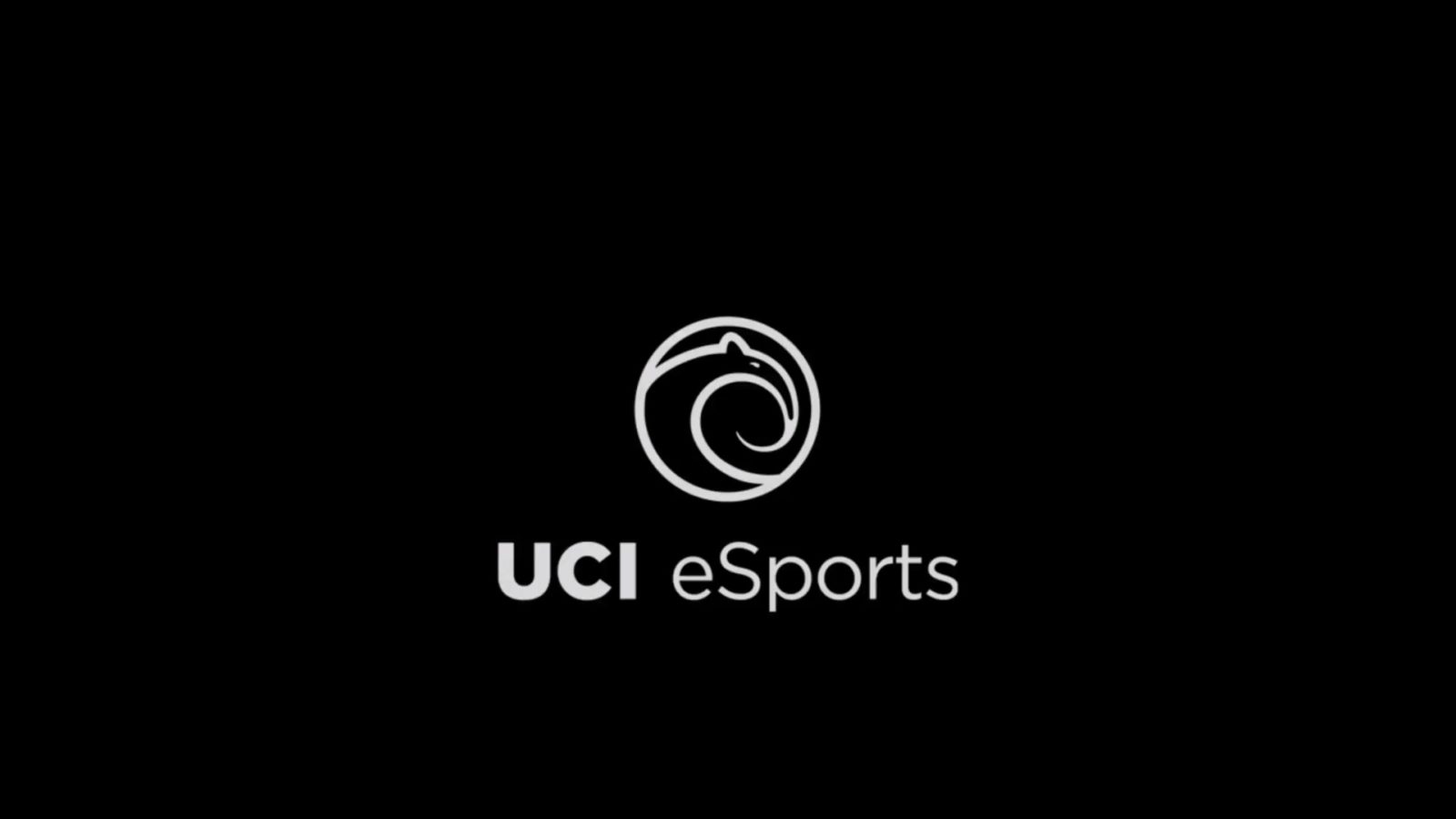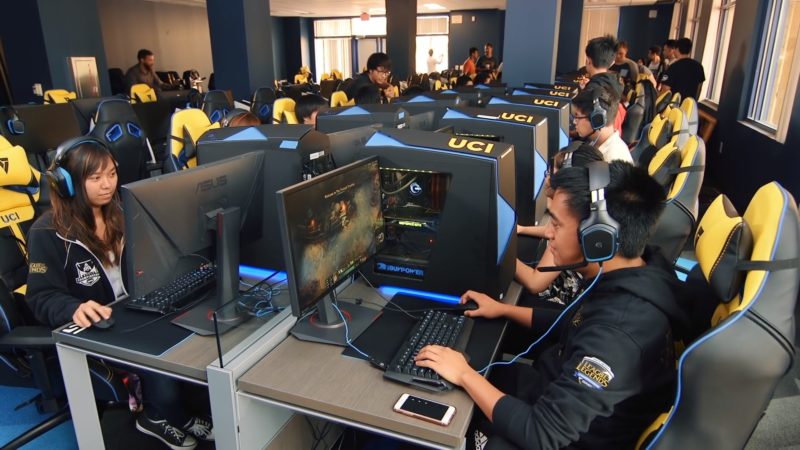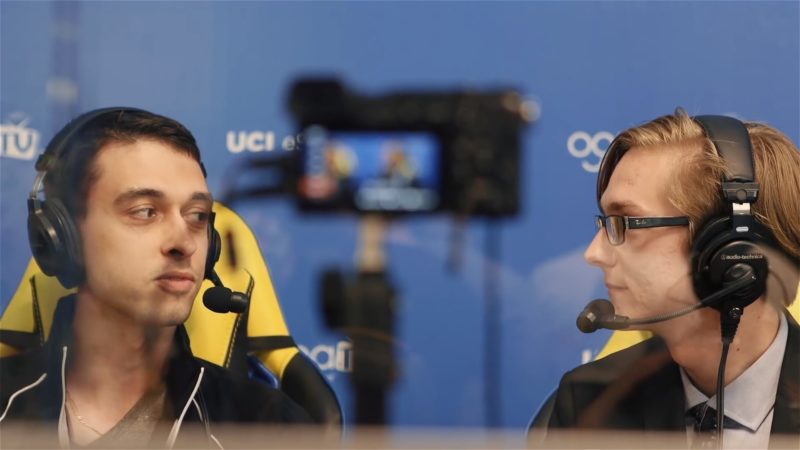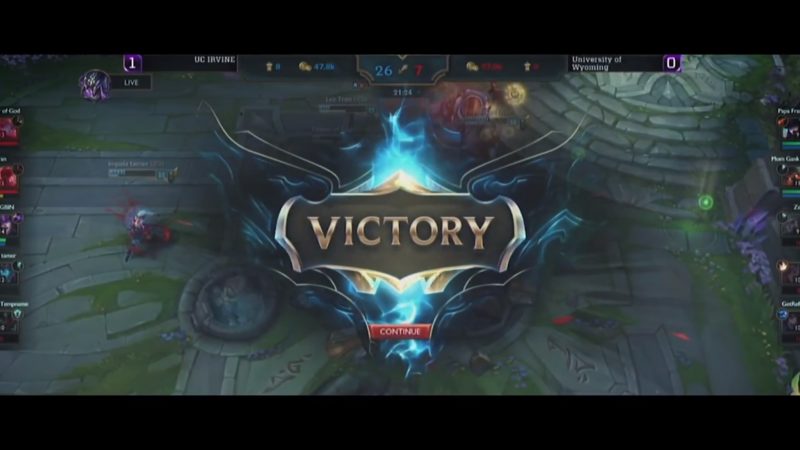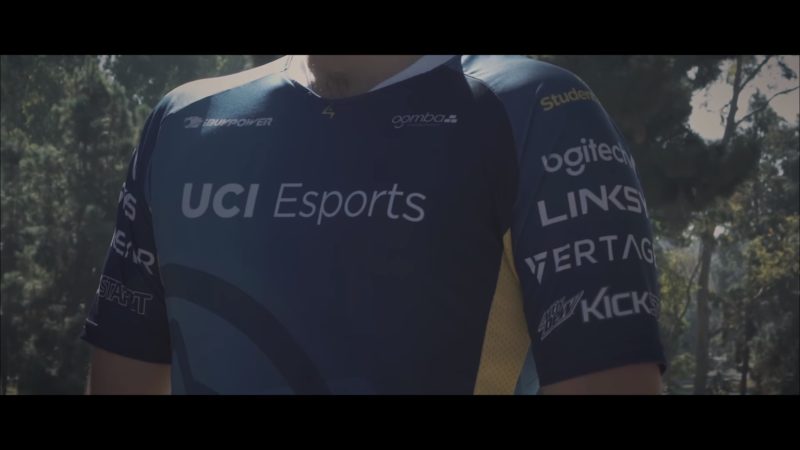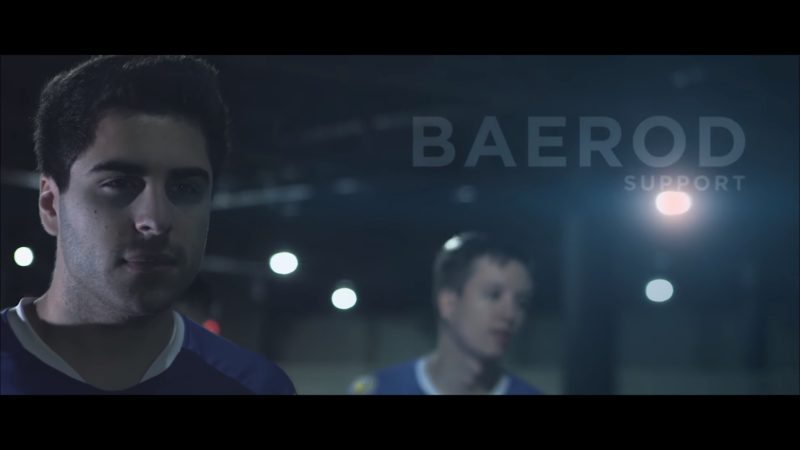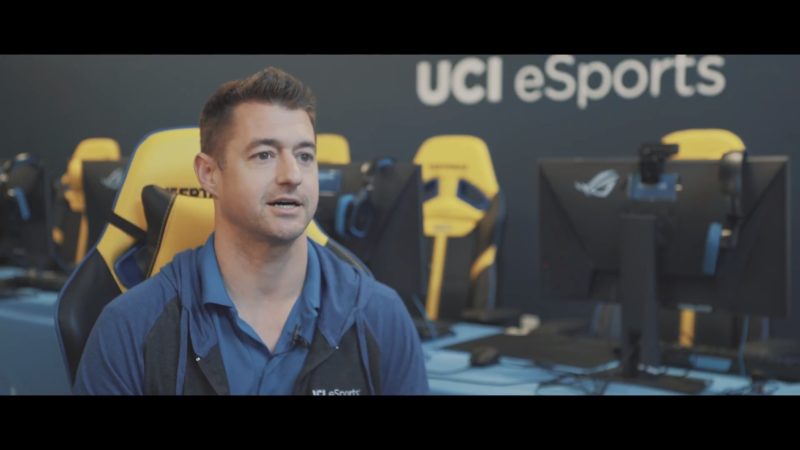IRVINE, CALIF. — There’s a door at the University of California, Irvine that leads to a training facility unlike any other on campus.
Lines of brightly-colored chairs that look like something out of Nascar sit in front of computers with price tags best left to the imagination. Video game posters dot the walls and their more humble chalk renditions are scrawled on pillars throughout the facility. Across from a broadcasting studio complete with lightning equipment and backdrops, professional league jerseys sit on display.
The jerseys carry signatures not of famous football or basketball players, but pro esports players. The teams are not the Cardinals, or Lakers, but Counter Logic Gaming, Phoenix1, Immortals and Cloud9.
“To be on our teams, you’re an elite League [of Legends] player,” UCI esports acting director Mark Deppe told The Daily Walkthrough. “You’ve been ranked in the top two, three, four hundred players in North America.”
In the room are students wearing headsets, hunched over rainbow keyboards, frantically clicking and clacking away. Don’t expect them to look up, they’re in another world.
No one paid any mind to TheDW or Deppe as we tucked ourselves next to two students playing Super Smash Bros. Melee on a GameCube plugged into a CRT TV.
“They’re not just casual players,” Deppe said, pointing to a group of students clustered by a set of monitors. “They’ve focused on getting very good at the game.”
UCI enrolls 35,958 undergraduate and graduate students. Fourteen of those students can be found regularly in this center across from the Jamba Juice doing what they do best — playing video games.
They are a part of the university’s new esports program, which awarded 14 scholarships this year to some of North America’s best League of Legends and Overwatch players.
League of Legends and Overwatch are video games created by Riot Games and Blizzard Entertainment, respectively. They draw in tens of millions of players from all over the world, and those lucky enough to be born at the right time with a penchant for virtual domination might earn tuition to play under university banners.
TheDW spoke to Deppe about what it’s like to be at the forefront of collegiate gaming and an industry most people have never heard of.
“Students are receiving partial tuition funding for playing for our teams,” Deppe said. “We have seven League of Legends players and seven Overwatch players.”
Even though esports involves a computer and not AstroTurf, his players follow rules similar to other scholarship athletes, like maintaining a 2.0 GPA and performing community service. But there are other, more unique requirements.
“They have to play a certain amount of games on their own and maintain a certain rank in the game. We require they all stream at least one hour a week on Twitch so people can follow them and they can create value by bringing eyeballs to the program.”
Twitch is an online streaming service that allows people to broadcast their computer screen (and their webcam) to anyone who wants to watch.
“Those are some of the things they have to do outside the obvious — attending practice, competing, using the peripherals we give them like wearing our jerseys.”
Deppe has a large and growing support staff helping him toward his goal of solidifying UCI’s self-funding esports program as the best in the country.
“The team started with me and Kathy Chiang, who is our arena coordinator. … We try to find the best coaches we can in the world of esports. It’s interesting when you recruit because these aren’t people with masters or Ph.Ds. They’re usually young people who have played the game a lot at a high level and have learned to create successful strategies.
“Our Overwatch coach, Jacob Bishop, has done a great job. We’re ranked No. 1 in North America. We’re 16-0 and have never lost in any competition or tournament we have entered. He’s 19 years old and taking a year off of junior college to coach. We have a remote analyst and assistant coach for that team who lives in Arizona. We also brought on our team founder, who’s a Ph.D student at the University of San Diego.”
And yes, Deppe was quick to add, they’re all paid — even the interns. Those same interns kept day-to-day operations running during our interview, buzzing around in our peripheral, checking people in and out, answering questions and tidying up. One of his interns, Hillary, spent her 2017 summer in Washington, D.C. working with TheDW.
“We have three interns right now: Hillary, Damian and Jess. All of them do lots of things, but essentially we allow them some freedom to do things they’re passionate about. They do everything from keeping the arena clean to running streaming and shout casting to being involved with our camps.”
Companies like iBUYPOWER, Logitech and Linksys sponsor UCI’s program. Deppe made the program’s fiscal year 2017 report available online, which breaks down “sources of funds” and expenses.
UCI didn’t agree to all of this without a bit of skepticism. It took months of persuading –and some good luck– for the university to agree to give the program a shot.
“We spent months asking them [the Student Center Board], pitching them to transition an old billiard room into an esports arena,” Deppe said. “We also built the business plan that requires zero dollars from the campus. We pay all our salaries and benefits, the rent for this space, utilities. Every cost affiliated with our program, we’ve found that money. About one-third of it comes from arena revenue and two-thirds comes from sponsorships … We don’t fund our program through winnings. All the winnings go to players at the moment.”
Unlike sports, esports doesn’t fall under the National Collegiate Athletic Association (NCAA) umbrella The NCAA’s board of governors met to discuss esports in October, and is investigating whether the NCAA should enter the space.
Most people, Deppe included, are not enthused about the prospect.
“I think we’re at an inflection point, whether people want to do the NCAA amateur model or if they want to allow students to benefit from their skills,” Deppe said. Many esports players use sites like Twitch and YouTube to make money off of their talent– something the NCAA doesn’t allow its traditional sports counterparts to do. “I’m on the radical side of ‘I’d love students to be able to monetize their abilities.'”
Dealing with potential NCAA involvement is just one problem. Kids are still kids, and playing a game on the computer instead of the field doesn’t exempt them from bouts of poor sportsmanship.
Toxicity “definitely happens,” according to Deppe, but he touted how the program’s infrastructure mitigates rage quitters and keyboard smashers. “One, I think you have to try to prevent it from happening, so that’s finding people who are level-headed and inviting positive people into your program … When it does happen, we have a conversation with everybody. We sit down, I have one-on-ones with our players every quarter … We have a lot of support staff to engage with our players. We also have a team psychologist who meets with our teams and talks about issues in games. We have a code of conduct that talks about our expectations for in-game behavior and how they’re going to represent themselves.”
UCI isn’t the only university in the country with an esports program. Schools in states all over are getting involved, from Boise State University in Idaho to Wesleyan College in West Virginia to Averett University in Virginia.
Behrod “Baerod” Baghai, UCI’s Overwatch team captain, talked to TheDW about balancing life, school, and collegiate esports. Baerod is not his middle name, it’s his in-game moniker and every player has one. Baghai was the president of Saddleback College’s gaming club and ran his successful Overwatch team there before he met Deppe and ended up at UCI.
“My brother is one of the League players [at UCI],” Baghai said. “He gave me an idea of how things work. Being there, seeing things in person was awesome.”
Deppe later offered him a scholarship for Overwatch and helped Baghai transfer from Saddleback to UCI.
“It was the idea of the program. The fact that you get a scholarship for Overwatch is insane,” he said. “I can go on the game and people recognize my name and say, ‘It’s so crazy how you get paid to go to school and play Overwatch!'”
Baghai’s team consists of Chansoo “Lootre” Park; Hengrui “ScareCr0w” Liu; Aaron “Lionpoke” Boyer; John “Learntooplay” Theodorakis; Sebastian “Selectt” Vasquez and Brenden “tildaebox” Alvarez. Their personalities and majors are as diverse as their monikers, and those differences help strengthen the team.
While Aaron “is for sure the loudest on the team,” Chansoo is “the most shy and reserved person.” Chansoo is so talented at Overwatch he hit eighth on the North America leaderboard. Then there’s Brenden, who Baghai described as “the most level-headed person I’ve ever met in my life. He’s the glue to the whole team and the most consistent player.”
Baghai and co. even managed to convert a fraternity brother to their side. Sebastian “used to be a frat boy, but once he gave up that life he became a gamer.”
Despite its newness, UCI esports is already securing a foothold as the premiere esports university. The Overwatch team has “played in seven tournaments over seven months and been first place in all of them,” Baghai said.
Claiming glory with a keyboard and mouse doesn’t exclude Baghai or any of the other 13 players from needing to stay healthy. “Physical activity in esports is important. We do a workout program and work with a trainer. Everyone’s going to the gym, exercising and getting healthier,” Baghai said.
It also isn’t any less stressful when it comes to navigating the delicate class-sports balance. Baghai pressed that UCI’s esports program is good at maintaining that balance, but there’s always room for improvement.
“Academics is huge … My problem is the mental stress academics give you is a hindrance to your performance. You can have the best players in the world but if we’re killed with homework and finals and essays and tests, we won’t be able to practice. I would like to see the program take more of a directive in helping its players with academics.”
No matter the stress Baghai or his teammates feel from college life, he had a message for anyone considering pursuing collegiate esports:
“Do what makes you happy,” he said. And if gaming makes you happy, you can now consider college.
“If they’re enjoying the game at that age and want to pursue it more, giving them the opportunity to attend a four-year institution like UCI, that would be the goal. Not only would they be able to enjoy video games but they would be able to learn academics for whatever they want to do in life,” he said.
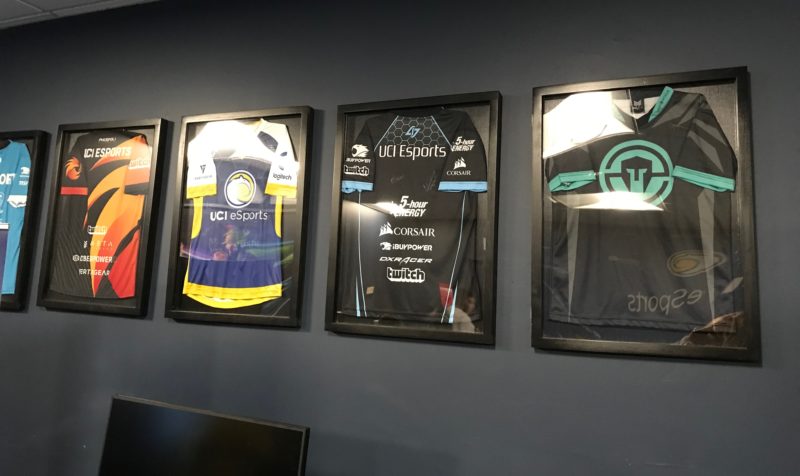
In many traditional sports, college functions as a developmental pipeline for players preparing to go pro after graduation. In esports, that pipeline doesn’t exist, and Deppe has to deal with the very real possibility of his athletes being lured away by a professional scene that’s not dependent on a college timeline.
Last year, one of his players put the program’s League team in jeopardy when a pro team offered him a shot.
Jung “Youngbin” Young-bin is the “jungler” on UCI’s League of Legends team. In League, a “jungler” is the person whose position is in the areas between mid, top and bottom. He was invited by Team Liquid, a professional team, to come down for a weekend.
“My initial instinct was to encourage him. In the end, before he left, I personally thought it wasn’t a good opportunity so I tried to convince him not to go. It ended up not working out, he only played for one weekend there and he’s actually back with us now,” Deppe said. “I’m very clear with our players that if they want to be a professional player and test those waters, don’t accept our scholarship. If I can’t adjust my roster or pick a new player, it cripples the whole team, the whole program. The goal is to get our scholarship and our offering so good we can compete with the professional scene. We’ll never give you hundreds of thousands of dollars, but could we cover all of college and then some? Maybe.”
The university estimates the yearly tuition cost for a student staying on campus is $33,158.47.
UCI’s esports program is actively pushing companies behind these games to implement esports clauses that forbid pro teams from snapping up collegiate athletes during the school year. UCI is also looking to future goals, including expanding scholarships beyond just players.
“We weren’t really up and streaming. We now stream 16 to 20 hours a week. Our players are casting, I have a weekly Q&A stream where I answer questions and inform other schools on how to build programs,” Deppe said. “We have shout casters. I’d love to expand scholarships out to all the areas of esports. I want to try to show people it’s not just the five or six people on stage, there’s a whole ecosystem that supports it. From social media to player engagement to management to shout casting to production.” Shout casters are play announcers for video games. There are also hosts and analysts.
Aditionally, his team has philanthropic plans.
“We’re looking to expand camps this summer. I want to do elite recruiting camps and do our girls’ camp again. A camp for underprivileged and underserved groups, too.
“We’re starting an Orange County high school esports league. We got funding from a big donor to build that. There’s research and coaching and stipends for faculty at high schools. We’re working with the OC Department of Education as well.” The Orange County project has multiple partners and Deppe told TheDW “the Samueli Foundation is really leading the charge.”
As for Deppe, starting UCI’s esports program wasn’t a lifelong passion. He only fell into it after two other dreams didn’t pan out.
“I worked a few walls over with the student government. I used to do events and programs. I missed out on a promotion I’d been aiming for for years. I was totally ready to do something new,” he told TheDW of the first dream. That’s when gaming caught his eye. He drove by Blizzard Entertainment every day on his way to campus while he was finishing his MBA and decided to do his Capstone Course on the company. That course pushed him to apply at Blizzard. Although a job never came of the application, the experience exposed him to esports.
“I started whispering the idea to my wife and people I trusted who wouldn’t stomp on my dreams. Everyone was like, ‘No, you should do that,'” Deppe laughed. “So many lucky things happened with such a fragile idea that we were able to pull it off.”
Outside, it was a bright California day. Students lounged at tables, rushed to classes and sipped their Jamba Juice, with little thought about what lay beyond the quiet door that hid their opponent-crushing, victory-claiming, beast-slaying classmates.
Signup for The Daily Walkthrough and follow us on Twitter, Facebook and YouTube

